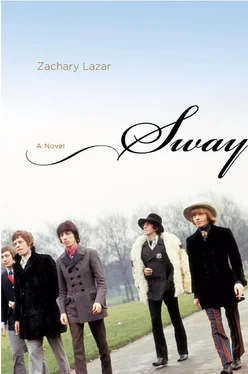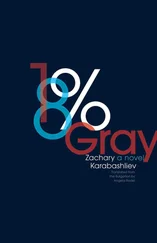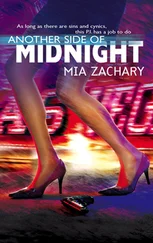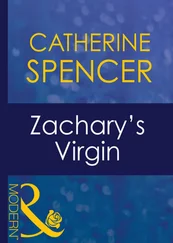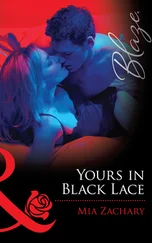We’d like to thank you all, New York, or Cleveland, or Chicago, or Miami. We’re going to start with a fast one now, a rock-and-roll number, and we’d like you all to get up and groove.
He would lick his lips, smiling, adjusting the microphone stand without having to look at it. Keith would stand by the drum kit with his head bent down, kicking his way free of his cord. He was so thin by then that it was hard to believe he was alive, the bones of his face as delicate as the bones of a monkey’s skull. He started with a riff of doubled or tripled notes that twisted off in different directions, dissonant almost to the point of randomness. At the first sound, Mick would raise his arms over his head and thrust his pelvis, his face in profile. He would turn back to look at the crowd. Before long, their faces would be mirroring every movement of his face. Even in the upper decks, they would see the red, white, and blue of his top hat. They would see the lavender scarf that fell past his waist, the thin body dressed all in black, the omega sign on his chest. They would climb up on each other’s shoulders, press up against the stage, and sometimes it wouldn’t be enough. Sometimes they would have to get up on the stage themselves, lunging at him, grabbing him by the shoulders or the head, trying to bring him down.
Their helicopter circled above the fans for several minutes before it landed. Behind them, they could see the traffic backed up for almost two miles, a line of cars cutting between rolling hills that were a grayish tan, like frost-damaged wheat. There was always a surprise at how big a crowd was, but this one looked even bigger and there was no stadium to give it form, just a colorless sprawl, hemmed in on two sides by wire fences. There were the towers of scaffolding for the lights and the P.A., the low black stage with its amplifier stacks, the fans scattered like bits of rag across the fields. From the helicopter, it seemed unrelated to them, a refugee city without plan or logic. They watched and didn’t say anything, looking down at the row of trailers to the side of the stage as the pilot banked to the left and began their descent.
On the ground, the pool cues were already coming down in sudden flurries, like hunters gathered around prey. From a few yards away, it looked planned, a tactical use of force. All the bikers had them — pool cues and cans of beer. Everyone had seen their share of news footage from Vietnam — the nighttime raids on village huts, the impromptu executions in the city streets — and this was something like that, the freedom to do whatever you were compelled to do, the unresisted urge.
It was late when Anger came out of the Sloane Square tube station. He started walking up the King’s Road with a shopping bag in his hand, passing huddled groups of nighttime stragglers, closed shops. London still made no sense to him, even after all this time. It was a mix of austerity and nostalgia, history fenced in by concrete, glass, prim rows of Victorian brick. In the streets, the black cabs were like a stubborn denial of time, impossible to take seriously.
He turned left on Oakley Street and headed southeast toward the river. It looked a little like Greenwich Village, only in front of the buildings there were rows of iron railings interspersed with thick stone pillars that looked almost like fortifications. He couldn’t look at London without thinking about World War II, the devastation. The older the buildings were, the more they brought to mind a ghost city that existed in parallel to the city he was in at the time.
He saw Bobby laughing, spitting on the floor, utterly lost. By now, the image had become a vague tightness behind his ribs, an emptiness in his stomach. It was with him all the time. He supposed that was how much he was still attached to Bobby, imagining that Bobby was thinking of him too, that they were somehow connected.
It was so much worse than anything he’d imagined. He would not have foreseen the blood on the walls, the crazy deliberateness, the mutilated bodies. That was how the Lucifer role had played itself out. That was who Bobby was now, the brute fact of his crime. That was all he would ever be.
He took a right turn onto Cheyne Walk, the only one on the street now. Mick lived in number 48, a white Georgian building three windows wide. On the second story was a wrought-iron veranda that looked almost Spanish, like something out of a Goya painting. There was a streetlamp in front of the gate, which helped him to see the keys in his hand: two ordinary keys, not even on a ring, keys that he might have plucked at random from a junk box. A few lamps had been left on inside the house, but he knew it was empty.
Once inside, he stood for a while looking at the living room: the tapestried chairs, the low tables, the hammered brass lamps. Everything was almost in silhouette, the light was so dim. He remembered the time a half year ago he had looked at the pictures of the murdered actress, Sharon Tate, and how it had reminded him of the band. He remembered thinking that the murders seemed like the kind of thing that might easily have happened to them. He remembered looking at the picture of the actress on the front page — blond, in her twenties — and thinking how much she looked like Anita.
They were always so stoned. That was how he’d managed to steal the keys and make copies, returning the originals before anyone even noticed.
He went upstairs to the library, the place where he’d showed Mick the film three months ago. He took a glass of water upstairs with him. The house was dark and silent, and there was something about the ordinariness of the glass he took that made it more difficult to be there. He put the shopping bag down on the desk beside the reels of film and stood there for a moment before he turned and opened the cabinet. The projector was on a sliding shelf. There was a screen that pulled down over two stacks of bookcases, like something from a spy movie. He spooled the film into the projector and switched off the desk lamp and took a sip of the water. Then he sat there in the dark with the film playing and tried to imagine it: the phone lines cut, Bobby and his friends appearing in the library, breathless, on the verge of laughter.
We’re here and there’s nothing you can do about it, their faces say. We’re here and we’re not going to leave.
When they came out onstage, it was dark. The fans had been waiting for almost three hours since the last opening band’s performance. There were Hells Angels everywhere, on the amplifiers and in the middle of the stage, in the front row of the crowd, pushing them back with pool cues and with their motorcycles. Keith bent over his guitar, crouched by the drum kit. They’d heard what it was like from the opening bands, but even now that they could see it for themselves they were still going to try to play their way though it, inured by this point to riots, crowds, warnings, threats. Keith stood upright to hit his first chord, nodding his head. Mick gripped the microphone with both hands, collapsing and rising, collapsing and rising, but by the middle of the first song the stage was so crowded they couldn’t go on. Everyone was looking at a brawl on the ground. Mick stood there in his devil’s suit and top hat, unable to understand what was happening. In his motionless bewilderment, he looked for a moment even younger than he was, a stranded boy in a plastic costume.
“Everybody just cool out,” he said. “Just cool out. Just stop it.”
It was hard to see what was going on from the stage, through the lights. Dogs crossed in front of the microphones. When they started again, they saw girls sitting on their boyfriends’ shoulders, dancing, glitter on their cheeks, smiling or closing their eyes. They saw the raised fists, the shaking heads, and sometimes it almost looked like an ordinary crowd with the usual few scuffles at the edges. They didn’t see the boy pushing his way forward, one of the few black fans in the crowd, dressed in a fedora and a green suit, his girlfriend behind him. They didn’t see it when he brushed against a biker near the stage, not turning around when the biker grabbed his shoulder but readying himself, gathering all the anger of being in this crowd, being black in this white crowd, all of it about to usher in this moment of confrontation. They played an old song about a girl, a pared-down version, bluesy but fast, treble guitars against the batter and crash of high-hat cymbals. The boy in the green suit took one last look at the band, knowing that the bikers had him, and then he drew his gun in a sudden flash, jostled by the crowd so that his raised arm pointed for a brief moment right at Mick.
Читать дальше
